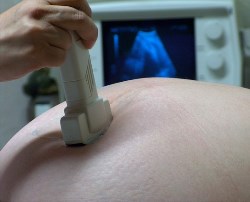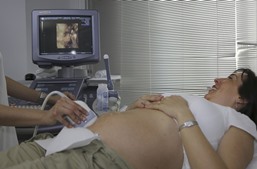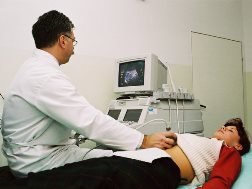How to Pick the Best Sonogram Technician Training Program near Cable Wisconsin
 Since you have decided to pursue an ultrasound technician degree near Cable WI, the next step is to begin the procedure of picking a school. To begin with, you need to find the right program that will furnish the appropriate instruction to become a qualified professional. And given that some states do mandate that ultrasound techs be either certified or licensed, depending on your residence you may also need to be prepared to pass a licensing or certification examination. So it’s very important that you research each program in order to assess and compare your alternatives. But just where does one start? Most students will begin by searching for colleges that are within commuting distance of their residences and then by comparing tuition. Of course location and cost need to be considered when making a decision, but there are other significant factors also. For example, if the ultrasound technician schools are accredited or if they sponsor internship programs. These and other qualifications will be addressed more in detail later in this article. But first, let’s go over what an ultrasound tech does and the degrees and online training options that are offered.
Since you have decided to pursue an ultrasound technician degree near Cable WI, the next step is to begin the procedure of picking a school. To begin with, you need to find the right program that will furnish the appropriate instruction to become a qualified professional. And given that some states do mandate that ultrasound techs be either certified or licensed, depending on your residence you may also need to be prepared to pass a licensing or certification examination. So it’s very important that you research each program in order to assess and compare your alternatives. But just where does one start? Most students will begin by searching for colleges that are within commuting distance of their residences and then by comparing tuition. Of course location and cost need to be considered when making a decision, but there are other significant factors also. For example, if the ultrasound technician schools are accredited or if they sponsor internship programs. These and other qualifications will be addressed more in detail later in this article. But first, let’s go over what an ultrasound tech does and the degrees and online training options that are offered.
Click Here to Get Free Information on Ultrasound Technician Schools!
Sonogram Tech Occupation Description
 There are various acceptable titles for ultrasound techs (technicians). They are also referred to as sonogram techs, diagnostic medical sonographers (or just sonographers) and ultrasound technologists. No matter what their title is, they all have the same basic job function, which is to perform diagnostic ultrasound testing on patients. Although a number of techs practice as generalists there are specializations within the profession, for example in cardiology and pediatrics. The majority work in Cable WI hospitals, clinics, outpatient diagnostic imaging centers and even private practices. Typical daily job duties of a sonogram tech can include:
There are various acceptable titles for ultrasound techs (technicians). They are also referred to as sonogram techs, diagnostic medical sonographers (or just sonographers) and ultrasound technologists. No matter what their title is, they all have the same basic job function, which is to perform diagnostic ultrasound testing on patients. Although a number of techs practice as generalists there are specializations within the profession, for example in cardiology and pediatrics. The majority work in Cable WI hospitals, clinics, outpatient diagnostic imaging centers and even private practices. Typical daily job duties of a sonogram tech can include:
- Maintaining records of patient medical histories and details of each procedure
- Counseling patients by explaining the procedures and answering questions
- Prepping the ultrasound machines for testing and then cleaning and recalibrating them
- Transferring patients to treatment rooms and ensuring their comfort
- Using equipment while limiting patient exposure to sound waves
- Assessing results and identifying need for supplemental testing
Sonographers must routinely evaluate the performance and safety of their machines. They also are held to a high ethical standard and code of conduct as medical practitioners. In order to maintain that degree of professionalism and stay current with medical knowledge, they are mandated to enroll in continuing education training on a regular basis.
Sonogram Technician Degrees Offered
 Ultrasound tech students have the option to acquire either an Associate Degree or a Bachelor’s Degree. An Associate Degree will typically involve around 18 months to 2 years to accomplish based upon the course load and program. A Bachelor’s Degree will require more time at up to four years to finish. Another option for individuals who have previously received a college degree is a post graduate certificate program. If you have received a Bachelor’s Degree in any major or an Associate Degree in a relevant health sector, you can enroll in a certificate program that will require only 12 to 18 months to complete. Something to keep in mind is that the majority of ultrasound technician programs do have a clinical training component as a portion of their curriculum. It often may be fulfilled by participating in an internship program which many colleges set up through Cable WI hospitals and clinics. When you have graduated from one of the degree or certificate programs, you will then have to satisfy the licensing or certification requirements in Wisconsin or whichever state you elect to work in.
Ultrasound tech students have the option to acquire either an Associate Degree or a Bachelor’s Degree. An Associate Degree will typically involve around 18 months to 2 years to accomplish based upon the course load and program. A Bachelor’s Degree will require more time at up to four years to finish. Another option for individuals who have previously received a college degree is a post graduate certificate program. If you have received a Bachelor’s Degree in any major or an Associate Degree in a relevant health sector, you can enroll in a certificate program that will require only 12 to 18 months to complete. Something to keep in mind is that the majority of ultrasound technician programs do have a clinical training component as a portion of their curriculum. It often may be fulfilled by participating in an internship program which many colleges set up through Cable WI hospitals and clinics. When you have graduated from one of the degree or certificate programs, you will then have to satisfy the licensing or certification requirements in Wisconsin or whichever state you elect to work in.
Ultrasound Technician Online Colleges
 As previously mentioned, nearly all ultrasound tech colleges have a clinical requirement to their programs. So while you can earn a degree or certificate online, a significant part of the training will be either held in an on campus laboratory or at an approved off-campus medical care provider. Clinical training can often be fulfilled by means of an internship at a local Cable WI outpatient clinic, hospital or private practice. However the balance of the training and classes can be attended online in your Cable home. This is particularly beneficial for those individuals that keep working while obtaining their degrees. In addition online colleges are many times less expensive than on campus alternatives. Costs for study materials and commuting may be lessened as well. But just as with every ultrasound tech college you are looking at, confirm that the online program you ultimately pick is accredited. Among the most highly respected accrediting organizations is the Commission on Accreditation of Allied Health Education Programs (CAAHEP). Accreditation is especially important for certification, licensing and job placement (more on accreditation later). So if you are dedicated enough to learn away from the classroom in the comfort of your own home, then an online school could be the right choice for you.
As previously mentioned, nearly all ultrasound tech colleges have a clinical requirement to their programs. So while you can earn a degree or certificate online, a significant part of the training will be either held in an on campus laboratory or at an approved off-campus medical care provider. Clinical training can often be fulfilled by means of an internship at a local Cable WI outpatient clinic, hospital or private practice. However the balance of the training and classes can be attended online in your Cable home. This is particularly beneficial for those individuals that keep working while obtaining their degrees. In addition online colleges are many times less expensive than on campus alternatives. Costs for study materials and commuting may be lessened as well. But just as with every ultrasound tech college you are looking at, confirm that the online program you ultimately pick is accredited. Among the most highly respected accrediting organizations is the Commission on Accreditation of Allied Health Education Programs (CAAHEP). Accreditation is especially important for certification, licensing and job placement (more on accreditation later). So if you are dedicated enough to learn away from the classroom in the comfort of your own home, then an online school could be the right choice for you.
Points to Ask Sonography Colleges
 Now that you have decided on the type of certificate or degree that you would like to earn, you can start the process of reviewing and comparing ultrasound tech colleges. You may first want to choose whether you would rather attend classes online or commute to a school campus in the Cable WI area. Obviously location will be significant if you select the latter, and the price of tuition no doubt will be an initial qualification also. But there are other variables that you should also take into account, such as if the programs are accredited and if they provide internship programs. So in order to complete your due diligence so that you can make your ultimate selection, below are some questions that you may want to ask each sonography college prior to making a decision.
Now that you have decided on the type of certificate or degree that you would like to earn, you can start the process of reviewing and comparing ultrasound tech colleges. You may first want to choose whether you would rather attend classes online or commute to a school campus in the Cable WI area. Obviously location will be significant if you select the latter, and the price of tuition no doubt will be an initial qualification also. But there are other variables that you should also take into account, such as if the programs are accredited and if they provide internship programs. So in order to complete your due diligence so that you can make your ultimate selection, below are some questions that you may want to ask each sonography college prior to making a decision.
Are the Ultrasound Technician Colleges Accredited? The majority of sonogram technician schools have acquired some form of accreditation, whether national or regional. Even so, it’s still imperative to make sure that the school and program are accredited. One of the most highly respected accrediting organizations in the field of sonography is the Joint Review Committee on Education in Diagnostic Medical Sonography (JRC-DMS). Schools receiving accreditation from the JRC-DMS have undergone a detailed evaluation of their instructors and course materials. If the program is online it can also earn accreditation from the Distance Education and Training Council, which focuses on online or distance education. All accrediting organizations should be acknowledged by the U.S. Department of Education or the Council on Higher Education Accreditation. Along with ensuring a superior education, accreditation will also assist in securing financial aid and student loans, which are frequently not available for non-accredited colleges. Accreditation might also be a pre-requisite for licensing and certification as required. And numerous Cable WI health facilities will only hire a graduate of an accredited school for entry level openings.
Are Internships Sponsored? Ask if the ultrasound tech programs you are assessing have relationships with Cable WI clinics or hospitals for internship programs. Not only are internships an excellent way to receive hands on experience in a clinical setting, they are additionally a way to satisfy the practical training requirement for the majority of programs. As a secondary benefit, they can assist students and graduates establish professional connections in the Cable medical community and help with job placement.
Is Job Placement Help provided? You will probably want to secure employment quickly after graduating, but finding that first job in a new field can be challenging without help. Ask if the sonographer schools you are interviewing have job assistance programs and what their success rates are. High and rapid placement rates are an excellent sign that the schools have large networks and good relationships with Wisconsin healthcare employers. It also corroborates that their students are highly regarded and in demand.
Where is the School Located? For many students, the college they decide on will have to be within commuting distance of their Cable WI residence. Individuals who have opted to attend classes online obviously will not have to trouble themselves with the location of the campus. However, the availability of local internships will be of importance. Something to keep in mind is that if you choose to enroll in a school that is out of state or perhaps out of your local area, you might be required to pay a higher tuition. State colleges usually charge higher tuitions for out of state residents. And community colleges often charge a higher tuition to those students that don’t reside within their districts.
What Size are the Classes ? Unless you are the kind of person that likes to sit far in the back of the classroom or hide in the crowd, you will undoubtedly prefer a small class size. Smaller classes enable more individual participation and personalized instruction. Ask the schools you are considering what the average teacher to student ratio is for their classes. If practical you may prefer to sit in on one or more classes before making your final decision. This will also give you a chance to talk with several of the instructors and students to get their opinions regarding the sonogram tech program as well.
Can the College Accommodate your Schedule? And finally you need to confirm that the ultrasound tech school you finally select can offer the class schedule you need. This is especially important if you decide to continue working while you attend classes. If you must schedule night or weekend classes in the Cable WI area, make certain that they are available. If you can only attend part-time, find out if that is an option and how many courses or credit hours you would have to carry. Also, find out what the procedure is for making up any classes that you may miss as a result of illness, work or family emergencies.
Ultrasound Technician Course Requirements Cable Wisconsin
 Enrolling in the right sonographer certificate or degree program is a vital first step to embarking on a fulfilling new career delivering diagnostic services to patients. Ultrasound technician colleges require that you have a high school diploma or a GED. Along with meeting academic standards, you should be in at least reasonably good physical condition, capable of standing for prolonged durations with the ability to regularly lift weights of fifty pounds or more, as is it often necessary to position patients and maneuver heavy machinery. Other beneficial talents include technical aptitude, the ability to stay calm when confronted by an anxious or angry patient and the ability to converse clearly and compassionately. You originally came to this website due to an interest in Ultrasound Technician Course Requirements and wanting more information on Associate Degree In Diagnostic Medical Sonography Online. However, as we have covered in this article, there are a number of questions that you need to ask each program you are considering. This is the case whether you choose an online degree or drive to the college campus to attend classes. And by asking the appropriate questions so that you can assess each program, you will be able to narrow down your alternatives until you are left with the ideal school for your education. And with the proper training, dedication and motivation to succeed, you can accomplish your objective to work as an sonographer in Cable WI.
Enrolling in the right sonographer certificate or degree program is a vital first step to embarking on a fulfilling new career delivering diagnostic services to patients. Ultrasound technician colleges require that you have a high school diploma or a GED. Along with meeting academic standards, you should be in at least reasonably good physical condition, capable of standing for prolonged durations with the ability to regularly lift weights of fifty pounds or more, as is it often necessary to position patients and maneuver heavy machinery. Other beneficial talents include technical aptitude, the ability to stay calm when confronted by an anxious or angry patient and the ability to converse clearly and compassionately. You originally came to this website due to an interest in Ultrasound Technician Course Requirements and wanting more information on Associate Degree In Diagnostic Medical Sonography Online. However, as we have covered in this article, there are a number of questions that you need to ask each program you are considering. This is the case whether you choose an online degree or drive to the college campus to attend classes. And by asking the appropriate questions so that you can assess each program, you will be able to narrow down your alternatives until you are left with the ideal school for your education. And with the proper training, dedication and motivation to succeed, you can accomplish your objective to work as an sonographer in Cable WI.
More Ultrasound Locations in Wisconsin
Wi-Fi
Wi-Fi (/ˈwaɪfaɪ/)[1] is technology for radio wireless local area networking of devices based on the IEEE 802.11 standards. Wi‑Fi is a trademark of the Wi-Fi Alliance, which restricts the use of the term Wi-Fi Certified to products that successfully complete, then after many years of testing the 802.11 committee interoperability certification testing.[2][better source needed]
Devices that can use Wi-Fi technologies include, among others, desktops and laptops, video game consoles, smartphones and tablets, smart TVs, printers, digital audio players, digital cameras, cars and drones. Wi-Fi compatible devices can connect to the Internet via a WLAN and a wireless access point. Such an access point (or hotspot) has a range of about 20 meters (66 feet) indoors and a greater range outdoors. Hotspot coverage can be as small as a single room with walls that block radio waves, or as large as many square kilometres achieved by using multiple overlapping access points.
Different versions of Wi-Fi exist, with different ranges, radio bands and speeds. Wi-Fi most commonly uses the 2.4 gigahertz (12 cm) UHF and 5 gigahertz (6 cm) SHF ISM radio bands; these bands are subdivided into multiple channels. Each channel can be time-shared by multiple networks. These wavelengths work best for line-of-sight. Many common materials absorb or reflect them, which further restricts range, but can tend to help minimise interference between different networks in crowded environments. At close range, some versions of Wi-Fi, running on suitable hardware, can achieve speeds of over 1 Gbit/s.
